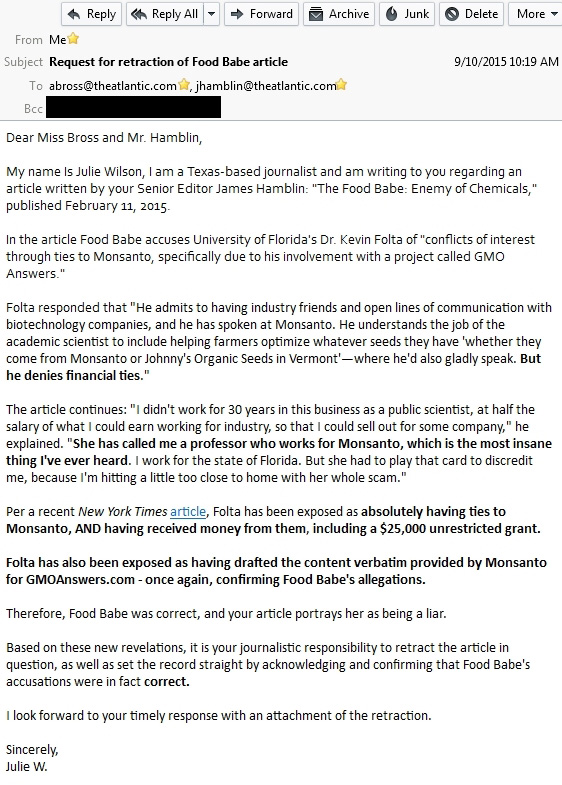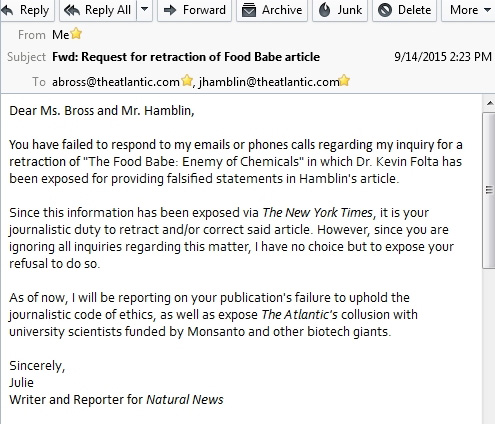
The Atlantic exposed for colluding with Monsanto-funded scientists after failing to retract fraudulent story defaming Food Babe
Julie Wilson
(NaturalNews) An unflattering media storm continues to engulf University of Florida professor Kevin Folta after he was exposed for colluding with the biotech industry, namely Monsanto, despite his repeated denials of any financial ties to the GM seed conglomerate.
The revelations, blown open by The New York Times (NYT) and made possible via FOIA requests filed by U.S. Right to Know, exposed Folta and dozens of other university scientists for posing as "independent researchers" while traveling the world on Monsanto's dime to promote GMOs and their associated pesticides.
However, the university scientists aren't the only ones suffering from embarrassment – the news publications that either blindly or deliberately pushed pro-GMO statements from industry-corrupted professionals disguised as "independent scientists" now have to deal with the aftermath of promoting Monsanto-funded disinfo campaigns.
The Atlantic violates journalistic code of ethics while colluding with Monsanto-funded scientists
The American magazine The Atlantic bought Folta's charade as an "independent scientist" hook, line and sinker when they ran a report rejecting Vani Hari's (the Food Babe) accusations that Folta had financial ties to Monsanto, particularly due to his involvement with a project called GMO Answers, to which Folta published nearly verbatim pro-GMO propaganda provided to him by Monsanto.
Despite Folta being outed as a lying Monsanto puppet, The Atlantic is refusing to retract or correct their story by failing to respond to Natural News' phone calls and emails requesting for such.
As illustrated below, The Atlantic has refused to respond to attempts to contact the publication.


"The Food Babe: Enemy of Chemicals," authored by The Atlantic's Senior Editor James Hamblin, essentially gave Folta the floor to attack the Food Babe when he said:
Vani is very good at marketing herself and telling people what they want to hear. She is very good at playing into the current popularity of vilifying farmers and large-scale agriculture. But really, she's her own company, and she's the spokesperson.
In response to Hari's accusation about Folta having financial ties to Monsanto, he stated:
I didn't work for 30 years in this business as a public scientist, at half the salary of what I could earn working for industry, so that I could sell out for some company. She has called me a professor who works for Monsanto, which is the most insane thing I've ever heard. I work for the state of Florida. But she had to play that card to discredit me, because I'm hitting a little too close to home with her whole scam. [emphases added]
Folta also complained about the regulatory system being "too stringent," preventing him and his biotech buddies from rolling out products they think will "help the planet," a.k.a. will generate money, big money. After all, dominating the global GM seed market is no small investment.
To have someone like Hari go out and make up nonsense that only digs into public opinion against these technologies is really frustrating for us.
Now that the Monsanto-funded scientists have been exposed, it's The Atlantic's (and other publications who pushed similar disinfo) journalistic duty to retract, or at the very least make it clear that Food Babe was right and Folta was in fact bribed by the biotech industry. Click here to view Monsanto's letter offering Folta $25K in unrestricted grant money, which he happily accepted, later telling corporate representatives that he was "glad to sign on to whatever you like, or write whatever you like."
Learn more about how biotech corporations are tampering with your food at GMOFood.news, powered by FETCH.news.
As usual, mainstream media values corporate interests over safety of the public
The media's willingness to protect Big Food and other poison-pushing corrupt corporations is completely detrimental to the clean food movement and directly places Americans in danger of risky foods, including GMOs and their associated pesticides such as glyphosate, which has been linked to a slew of serious health problems.
The more widespread GMO agriculture becomes, the more unsustainable our food system grows. Zero long-term safety studies have been conducted on GMOs; however, on the other hand, countless horror stories[PDF] have emerged regarding the devastating effects of GMO agriculture.
It's incredibly important that the general public, as well as clean food advocates, call on The Atlantic to retract and/or correct their story which has now been exposed as being fraudulent following the NYT's groundbreaking report: "Food Industry Enlisted Academics in G.M.O Lobbying War, Emails Show."
Demand a retraction by tweeting @TheAtlantic with a link to this story and do the same on their Facebook page. The magazine will surely cave into retracting if enough people voice their disdain.
The public deserves clean, non-toxic food and they deserve transparency. In order to achieve transparency, the media absolutely needs to be held accountable for publishing disinfo, especially if they wish to be viewed as "independent" media – free of corporate sponsorship.
Contact The Atlantic today!
Anna C. Bross
Senior Director of Communications, The Atlantic
202-266-7714
James Hamblin
Senior Editor, The Atlantic
To search for breaking news and important information, try GoodGopher.com, the world's first search engine to filter out corporate disinformation and government propaganda while protecting your privacy!
Additional sources:
Greenpeace.org[PDF]
http://www.naturalnews.com/z051198_The_Atlantic_Food_Babe_Monsanto_propaganda.html
